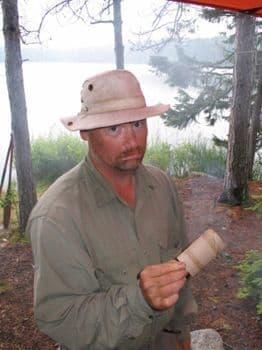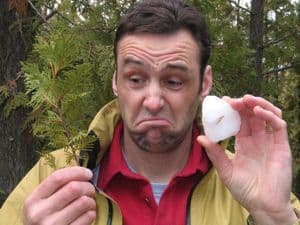Pooping Perfectly in the Woods
No one seems to want to want to talk about this, but a poop properly disposed of behind camp can make or break the group dynamics during any trip. To start, before the spot is chosen and the trousers are dropped, a proper camp attitude must be set or you'll have turd anarchy. Laugh about it, share stories about it, and more importantly make it common knowledge that excreting waste from your bowels is a natural occurrence that all members of the group do at any given time of the day, but that the disposal of it must be done in an environmental matter.

Sounds silly, but the more you keep the act of pooping a private session, the more accidental displacement of poop you'll have at camp.
Write up a poop plan and stick to it:
- Regulate a safe distance traveled in the backwoods before any feces is actually released into the wilds (it should be at least 50 meters).
- Place a bag containing communal TP, hand sanitizer, small spade, and favorite paddling magazine hanging on a tree limb (a bag missing from the limb symbolizes that the forest is presently occupied).
- If there's a health and safety expected treasure chest (thunder box, candy box, outhouse…etc.) available then it is agreed upon that everyone makes use if it.
- If no outhouse is available then the spade is used to dig a "cat-hole" (the process of turning up 3-4 cm of topsoil and, when finished, cover up the nasty bits with a mound of dirt, just as a cat does in the litter box (cat-holes are much more efficient in breaking the manure down to potting soil than the Boy Scout routine of a deeply dug trench).
- Announce to everyone back at camp that it was a success and add detailed information on the position used (a simple squat, over a log, back up against a tree…etc.)
- Return, very carefully, with the wad of TP and discretely, or not discretely, dispose of it in a very hot camp fire.
- Wait at least ten minutes before toasting marshmallows.

TP Substitutes
According to National Outdoor Leadership School (NOLS) the best alternatives for toilet paper are pinecones, snow, sticks, and weathered rocks. The Roman army used a sponge attached to a stick soaked in salt water. Natives in coastal areas used mussel shells. The Cree preferred sphagnum moss. And the Ojibwa liked the soft and fragrant leaf from a wild ginger plant.
Compost Toilets
Some parks are now experimenting with compost toilets placed at campgrounds and interior campsites. Rather than the traditional "hole-in -the-ground" outhouse or water-based disposal units, these ecological toilets use layers of sawdust and the microorganisms already present in human waste to break everything down. Each spring the toilets are emptied and its natural fertilizer is spread out over the forest floor.
Poop in the sea
I have no experience with this one, but rumor has it that sea water can degrade human waste far faster than topsoil. So, when camped along the ocean it is customary to wade out into the surf to go poop and if toilet paper is needed it is taken back with you to burn in the fire.
Feminine Hygiene
Feminine hygiene products should be either burned in a hot fire or carried out in a plastic bag. Do not dispose of them by burying them. Wild animals, especially squirrels and bears, will be attracted to the strong scent of the pheromones and dig them up, decorating the camp with them.
Kevin Callan is the author of 11 books including "The Happy Camper"and "Wilderness Pleasures". A regular keynote speaker at major North American canoeing and camping expos for over 20 years, Kevin has received three National Magazine Awards and four film awards, including top award at the prestigious Waterwalker Film Festival. Callan lives in Peterborough, Ontario, birthplace of the modern-day canoe. Check out Kevin's web site: kevincallan.com
Related Articles
This question is from imsealin – they asked how long should a kayak be for sea kayaking, and can it be…
For the first time ever, three adventurers paddled all three of Patagonia's toughest rivers through some…
Spring is here and the air is warm. But just because the day is beautiful doesn't mean the water…
My name's Ken Whiting. I'm a world champion white water paddler. And I've led trips and taught…



